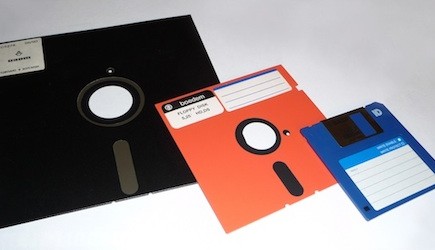Smallest Data Storage Device Ever: 12 Atoms per Bit
January 19, 2012
on
on

A conventional hard drive uses 125 million atoms to store a bit. The smallest magnetic data storage device in the world needs only 12.
Interested in the trend of miniaturizing electronic components, scientists of IBM and the German Center for Free-Electron Laser Science (CFEL), decided to start from the other end. Instead of shrinking existing components they started with the smallest building block, the atom, and built a storage device one atom at a time.
Using a Scanning Tunneling Microscope (STM), which enables the scientists to observe and manipulate individual atoms, they configured iron atoms in orderly rows of 6. A pair of rows has 2 possible magnetic states representing 1 and 0. So it takes 12 atoms to store 1 bit.
Below the threshold of 12 atoms quantum effects start interfering with the stored data.
The data can be read and written with the STM. An electric pulse from the STM flips the magnetic state of the atoms, switching them from 1’s to 0’s or vice versa. When the STM sends out a weaker pulse it doesn’t manipulate the atoms but only observes their state, thus reading the data.
At the current stage of development the storage device is only stable at minus 268 degrees centigrade (5 Kelvin) so it won’t be consumer market-ready any time soon.
But for experimental physicist Sebastian Loth of CFEL that is not the primary issue.
"Our work goes far beyond current data storage technology," says Loth. "We have learned to control quantum effects through form and size of the iron atom rows. We can now use this ability to investigate how quantum mechanics kicks in. What separates quantum magnets from classical magnets? How does a magnet behave at the frontier between both worlds? These are exciting questions that soon could be answered."
The scientists have published their findings in Science: Bistability in atomic-scale antiferromagnets"; Sebastian Loth, Susanne Baumann, Christopher P. Lutz, D.M. Eigler, Andreas J. Heinrich; Science, Bd. 335, S.196, DOI: 10.1126/science.1214131
Via: Eurekalert.org
Image: Extremetech.com
Interested in the trend of miniaturizing electronic components, scientists of IBM and the German Center for Free-Electron Laser Science (CFEL), decided to start from the other end. Instead of shrinking existing components they started with the smallest building block, the atom, and built a storage device one atom at a time.
Using a Scanning Tunneling Microscope (STM), which enables the scientists to observe and manipulate individual atoms, they configured iron atoms in orderly rows of 6. A pair of rows has 2 possible magnetic states representing 1 and 0. So it takes 12 atoms to store 1 bit.
Below the threshold of 12 atoms quantum effects start interfering with the stored data.
The data can be read and written with the STM. An electric pulse from the STM flips the magnetic state of the atoms, switching them from 1’s to 0’s or vice versa. When the STM sends out a weaker pulse it doesn’t manipulate the atoms but only observes their state, thus reading the data.
At the current stage of development the storage device is only stable at minus 268 degrees centigrade (5 Kelvin) so it won’t be consumer market-ready any time soon.
But for experimental physicist Sebastian Loth of CFEL that is not the primary issue.
"Our work goes far beyond current data storage technology," says Loth. "We have learned to control quantum effects through form and size of the iron atom rows. We can now use this ability to investigate how quantum mechanics kicks in. What separates quantum magnets from classical magnets? How does a magnet behave at the frontier between both worlds? These are exciting questions that soon could be answered."
The scientists have published their findings in Science: Bistability in atomic-scale antiferromagnets"; Sebastian Loth, Susanne Baumann, Christopher P. Lutz, D.M. Eigler, Andreas J. Heinrich; Science, Bd. 335, S.196, DOI: 10.1126/science.1214131
Via: Eurekalert.org
Image: Extremetech.com
Read full article
Hide full article


Discussion (0 comments)